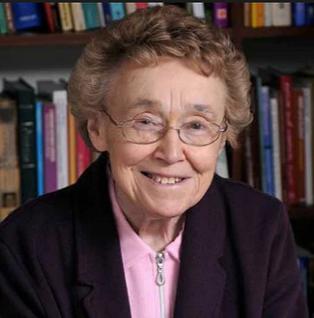
Asperger syndrome (AS), also known as Asperger's syndrome, formerly described a neurodevelopmental disorder characterized by significant difficulties in social interaction and nonverbal communication, along with restricted and repetitive patterns of behavior, interests, and activities. The syndrome has been merged with other disorders into autism spectrum disorder (ASD) and is no longer considered a stand-alone diagnosis. It was considered milder than other diagnoses which were merged into ASD due to relatively unimpaired spoken language and intelligence.

Mary Temple Grandin is an American academic and animal behaviorist. She is a prominent proponent of the humane treatment of livestock for slaughter and the author of more than 60 scientific papers on animal behavior. Grandin is a consultant to the livestock industry, where she offers advice on animal behavior, and is also an autism spokesperson.

Lorna Gladys Wing was an English psychiatrist. She was a pioneer in the field of childhood developmental disorders, who advanced understanding of autism worldwide, introduced the term Asperger syndrome in 1976 and was involved in founding the National Autistic Society (NAS) in the UK.
Anthony John Attwood is a British psychologist notable for his work on Asperger syndrome. He resides in Queensland, Australia, where he is an Associate Professor at Griffith University.

The autism rights movement, also known as the autistic acceptance movement, is a social movement allied with disability rights that emphasizes a neurodiversity paradigm, viewing autism as a disability with variations in the human brain rather than as a disease to be cured. The movement advocates for several goals, including greater acceptance of autistic traits and behaviors; reforms of services - i.e. services that focus on improving quality of life and well-being instead of suppression and masking of autistic traits that are adaptive or not harmful or imitations of social behaviors of allistic (non-autistic) peers ; the creation of social networks and events that allow autistic people to socialize on their own terms; and the recognition of the autistic community as a minority group.
Norman Michael Ledgin was an American writer and journalist, living in the Stanley section of Overland Park, Kansas. He was known for two books dealing with autism, Asperger's and Self-Esteem: Insight and Hope Through Famous Role Models (2002) and Diagnosing Jefferson: Evidence of a Condition that Guided His Beliefs, Behavior, and Personal Associations (2000). The latter argues that Thomas Jefferson demonstrated traits of Asperger syndrome. In 2012 he completed the historical novel "Sally of Monticello: Founding Mother," a portrayal of the 38-year love affair between Thomas Jefferson and Sally Hemings.
Gerald Newport (1948–2023), better known as Jerry Newport, and Mary Newport, née Mary Meinel, also known as Mary Meinel-Newport, were authors, advocates, and public speakers who had been diagnosed with Asperger syndrome and whose lives became the basis for the 2005 film Mozart and the Whale. Their written works include self-help books related to autism and Asperger's, as well as their 2007 memoir Mozart and the Whale: An Asperger's Love Story.

Wrong Planet is an online community for "individuals with Autism, Asperger's Syndrome, ADHD, PDDs, and other neurological differences". The site was started in 2004 by Dan Grover and Alex Plank and includes a chatroom, a forum, and articles describing how to deal with daily issues. Wrong Planet has been referenced by the mainstream U.S. media. Wrong Planet comes up in the special education curriculum of many universities in the United States. A page is dedicated to Wrong Planet and its founder in Exceptional Learners: Introduction to Special Education.

Like Colour To The Blind (1996) is the third in a series of four autobiographical works by internationally bestselling autistic author Donna Williams. Once published in the US using the American spelling 'color', it is now published worldwide by Jessica Kingsley Publishers using the UK spelling 'colour'. It has been published in several languages worldwide.

Societal and cultural aspects of autism or sociology of autism come into play with recognition of autism, approaches to its support services and therapies, and how autism affects the definition of personhood. The autistic community is divided primarily into two camps; the autism rights movement and the pathology paradigm. The pathology paradigm advocates for supporting research into therapies, treatments, and/or a cure to help minimize or remove autistic traits, seeing treatment as vital to help individuals with autism, while the neurodiversity movement believes autism should be seen as a different way of being and advocates against a cure and interventions that focus on normalization, seeing it as trying to exterminate autistic people and their individuality. Both are controversial in autism communities and advocacy which has led to significant infighting between these two camps. While the dominant paradigm is the pathology paradigm and is followed largely by autism research and scientific communities, the neurodiversity movement is highly popular among most autistic people, within autism advocacy, autism rights organizations, and related neurodiversity approaches have been rapidly growing and applied in the autism research field in the last few years.

Johann Friedrich Karl Asperger was an Austrian physician. Noted for his early studies on atypical neurology, specifically in children, he is the namesake of the autism spectrum disorder Asperger syndrome. He wrote more than 300 publications on psychological disorders that posthumously acquired international renown in the 1980s. His diagnosis of autism, which he termed "autistic psychopathy", also garnered controversy. Further controversy arose during the late 2010s over allegations that Asperger referred children to a Nazi German clinic responsible for murdering disabled patients, although his knowledge and involvement remains unknown.
Autism spectrum disorders (ASDs) or autism spectrum conditions (ASCs) describe a range of conditions classified as neurodevelopmental disorders in the DSM-5, used by the American Psychiatric Association. As with many neurodivergent people and conditions, the popular image of autistic people and autism itself is often based on inaccurate media representations. Additionally, media about autism may promote pseudoscience such as vaccine denial or facilitated communication.

Rudy Simone is an American author of books on Asperger's Syndrome.
Autism-friendly means being aware of social engagement and environmental factors affecting people on the autism spectrum, with modifications to communication methods and physical space to better suit individual's unique and special needs.

The Reason I Jump: One Boy's Voice from the Silence of Autism is a biography attributed to Naoki Higashida, a nonverbal autistic person from Japan. It was first published in Japan in 2007. The English translation, by Keiko Yoshida and her husband, English author David Mitchell, was published in 2013.

Jonathan Mitchell is an American author and autistic blogger who writes about autism including the neuroscience of the disorder and neurodiversity movement. His novel The Mu Rhythm Bluff is about a 49-year-old autistic man who undergoes transcranial magnetic stimulation.
The history of autism spans over a century; autism has been subject to varying treatments, being pathologized or being viewed as a beneficial part of human neurodiversity. The understanding of autism has been shaped by cultural, scientific, and societal factors, and its perception and treatment change over time as scientific understanding of autism develops.

Stephen Mark Shore is an American autistic professor of special education at Adelphi University. He has written several books on autism: College for Students with Disabilities, Understanding Autism for Dummies, Ask and Tell, and Beyond the Wall. Currently, he serves on the board of Autism Speaks, and is one of the first two autistic board members in its history, looking to improve the potential of those on the autism spectrum. He once headed the Asperger's Association of New England and was on the board of the Autism Society of America.

David Christopher Miedzianik is an English autistic poet and writer. His writings portray the more difficult aspects of autism. Additionally, most of his poems focus on social difficulties that he experiences. He is unemployed, but writes about how he wants to work and find love. Miedzianik writes about specific examples pertaining to those desires. Miedzianik's works have been extensively analyzed by noted autism researchers, who describe his writing as thoughtful, sophisticated, and displaying an unusually strong awareness of his social difficulties.











